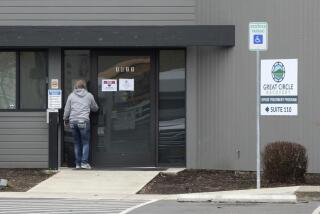Paralegal to the Rescue : Oregon Woman Finds Big Market for Inexpensive Assistance
- Share via
PORTLAND, Ore. — “Eat dessert first. Life is uncertain,” advises the plaque over the desk of Peggy Ann Baker Muse.
Life has often been uncertain for Muse, 37, the country’s most successful independent paralegal. And she thrives on it.
Eight years ago, the divorced and jobless mother of three set up shop in a $50-a-month attic with a card table and a single phone, offering--for fees of $20 to $30--to help consumers complain about faulty mobile homes or dirty health spas.
Last year, her company, Consumer Sounding Board Inc., with 10 employees in offices in Medford, Portland and Eugene and a van-office serving clients from Bend in the mountains to Coos Bay on the coast, grossed $250,000.
Muse and her staff have helped more than 17,000 Oregonians with simple legal problems including consumer complaints, wills, divorces, step-parent adoptions and name change and bankruptcy petitions.
“Peggy is certainly unique,” said Ralph (Jake) Warner, a drop-out Legal Aid attorney who co-founded Berkeley’s Nolo Press, publisher of 50 legal self-help books. Warner has written a soon-to-be-published book featuring Muse: “Independent Paralegals Handbook: How to Provide Legal Services Without Going to Jail.”
Paralegals Common
Paralegals working in law offices, interviewing clients and assisting attorneys with research or document preparation, are commonplace. Independent paralegals, or entrepreneurs who charge modest fees to help litigants handle their own legal problems, survive only on the West Coast, where society is more consumer-oriented.
“As far as I know, California and Oregon are the only states where people have come close to breaking through, and Oregon is totally, thanks to Peggy,” Warner said. “Rosemary Furman is pretty typical of what would happen anywhere else.”
Furman, a Florida legal secretary who filled out divorce forms in her kitchen for $50 fees, was accused by the 31,000-member Florida Bar of unauthorized practice of law and sentenced in 1983 to a month in jail for contempt. She was granted clemency and never served the sentence, but was forced to abandon her paralegal operation.
Nearly 50 independent paralegal offices operate in California, and a handful are almost as successful as Muse’s. But, unlike Muse, virtually all of the California operations limit themselves to preparing divorces in a single office.
Warner expects the number of independent paralegals to grow because of consumer need, Muse’s successful example and a lessening of harassment from the legal establishment.
The State Bar of California has dissolved its committee that once monitored unauthorized practice of law, leaving the problem to district attorneys who act only if they receive consumer complaints of misleading advertising or other illegal acts.
“There seems to be a gray area of legal services that can’t be met by Legal Aid because of lack of funding or the bar because of cost,” said C. Douglas Oliver, whom Muse pays a retainer to defend her against the Oregon State Bar and in other litigation.
“There is a problem of getting legal services to people who can’t afford attorneys. Until society addresses that . . . there is going to be a need for someone to go out there and meet the need of the consuming public.”
Muse found her consuming public in Medford. Married at 18 and divorced at 22 with a daughter and twin sons to support, she moved there to write a consumer help column for a community newspaper.
When the column was canceled after a few years, she decided to go into business to help the consumers who continued writing to her. Never strongly motivated by money, she did need to make a living. But her prime motivations, she said candidly, were power, making a lasting mark on society and impressing a man she was involved with.
Muse Makes Her Mark
She has made enough of a living to support a house in suburban Lake Oswego, take month-long vacations in California and Mexico, help her 18-year-old college freshman daughter and think of putting her 16-year-old twins through law school. And she has made her mark.
In her first month, Muse handled 35 consumer complaints. When a retired couple discovered, for example, that formaldehyde in their new mobile home was making the wife sick, Muse enlisted the aid of the Oregon Mobile Home Dealers Assn. and forced the dealer to buy back the trailer. She charged the couple $30.
Within two months, she moved from the attic to an office and hired a full-time assistant.
Within four years she was defending herself in court.
Threatened by the Oregon State Bar, Muse voluntarily signed an injunction prohibiting her from accompanying clients to court, drafting documents or giving legal advice in any way. In 1982, she was held in contempt for violating that order by allowing employees to fill in bankruptcy forms for clients, rather than merely typing what clients wrote.
She was sentenced to four months in jail, but the sentence was suspended. The state appellate court upheld the sentence without elaboration, and Muse declined to appeal further because of the legal costs.
Dispute on Jurisdiction
A dispute has developed over whether the State Bar or the attorney general is responsible for prosecuting cases of unauthorized practice of law.
The Oregon attorney general has declined to take any action against Consumer Sounding Board because no complaints have been received. The Oregon State Bar, according to general counsel George A. Riemer, will continue to monitor Muse, going to court only if she again violates the Medford injunction.
Riemer denied the bar has had any vendetta against Muse, saying the bar has only tried to carry out the Legislature’s purpose in licensing lawyers--protect the public from untrained, incompetent people.
He also denied that the bar’s central goal is protecting its 9,000 members’ economic interest, noting the bar had pursued and won only 10 court rulings against individuals for unauthorized practice of law since its organization in 1935.
Last year, Muse moved her battle to legitimize her profession to the state Legislature, lobbying for a bill to license “scriveners,” an old-fashioned name she hoped would not offend paralegals working for lawyers.
“I was scared to death,” she said. “I felt like ‘Gidget Goes to the Capital.’ ”
Bill Dies in Committee
The bill, opposed by the state bar because it provided no supervision of independent paralegals, died in committee. But Muse is determined to revive it in the Legislature’s next session in 1987, this time using the name she calls herself--independent paralegal.
Somewhat cynical about any kind of licensing, Warner, of Nolo Press, believes licensing may be necessary for independent paralegals “because it is the only way to combat the bar’s feeling that ‘you are idiots and only we can do these things.’ ” And if Oregon does it, he predicted, so will California.
Whether sitting in the back of her van office at a Denny’s parking lot in Salem or behind her own desk in Portland, Muse soothes her clients with concern, humor and rapid-fire information.
“I will give you information but I want you to know we are not attorneys. We are independent paralegals. We will consult and give you enough information so you can file this yourself,” she tells Don, a bankruptcy client who has just lost his photography business and been divorced and who came to Muse because he couldn’t afford the $200 to $500 that attorneys quoted.
‘Have Any Questions?’
“Do you have any questions?” she asks after outlining the bankruptcy requirements and promising to have the forms typed within a week, adding with a needed laugh, “You look pretty desperate.” He walked out, form in hand, encouraged.
“When we talked on the phone, it was kind of like a friend,” he said in explaining why he came to Consumer Sounding Board, echoing hundreds of testimonials Muse uses freely in advertisements in small newspapers. “First of all, I could afford it, and they make you feel they can do it.”
Early in each interview she spells out her prices--$30 for wills, $49 for divorce forms, $95 for bankruptcy or adoption and $45 for a name change.
When a jobless, divorced mother said she would have to borrow Muse’s fee for preparing a bankruptcy petition, Muse knocked off $20.
Working in the van in Salem, Muse and a top assistant reassured in rapid succession an out-of-work chef named Herb who wanted to file bankruptcy, a divorced woman named Darlene who wanted a new surname and John May who wanted help filing for divorce.
Turned off by the $300 to $500 lawyers asked for a divorce, May was intrigued by a friend’s suggestion that he go to Consumer Sounding Board. After trying to file his own divorce with poor results, he decided to pay their $49 fee for some help.
Cites Convenience of Van
“The one thing that inspired me was that they have a van that goes around, so it is easy to take advantage of their services,” he said.
Lawyers, May insisted, profit from creating “a whole lot of hate and discontent” in a divorce to prolong court proceedings. Handling his own divorce with Muse’s help, he said, would allow his wife and him to remain friends and also prevent them from going into bankruptcy.
“The van,” Muse said, “brings services to the people where they need them and also teaches lawyers that they dare not sit in their ivory towers expecting these people to come to them.
“The van isn’t profitable yet, but it will be,” she said of her roving auxiliary office. “This is going to be as popular as the library’s bookmobile.”
It has been some time since Muse, a one-time model with a cloud of naturally curly black hair, put on her Wonder Woman costume to present a good guy award to a businessman or marshalled pickets and a 6-foot-4 costumed friend to bestow a “skunk-of-the-month” award on a business that was bilking consumers.
With her three offices and van monopolizing the Oregon legal self-help market, she is considering opening an office in the state of Washington and has incorporated Consumer Sounding Board’s name and trademark in California. She doubts she could afford the time or money to open offices throughout the country, but plans to conduct seminars and consult with others who will.
Life is more certain for Peggy Muse these days. At a recent dinner out, she even ate her berry cobbler last.
More to Read
Inside the business of entertainment
The Wide Shot brings you news, analysis and insights on everything from streaming wars to production — and what it all means for the future.
You may occasionally receive promotional content from the Los Angeles Times.










